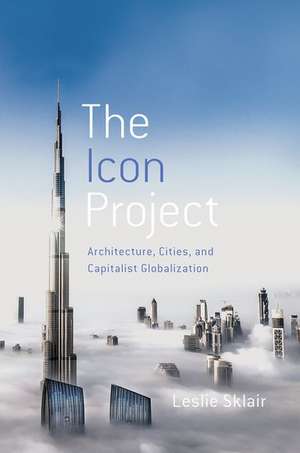The Icon Project: Architecture, Cities, and Capitalist Globalization
Autor Leslie Sklairen Limba Engleză Hardback – 20 apr 2017
| Toate formatele și edițiile | Preț | Express |
|---|---|---|
| Paperback (1) | 175.39 lei 10-16 zile | |
| Oxford University Press – 13 aug 2019 | 175.39 lei 10-16 zile | |
| Hardback (1) | 257.89 lei 31-37 zile | |
| Oxford University Press – 20 apr 2017 | 257.89 lei 31-37 zile |
Preț: 257.89 lei
Preț vechi: 300.14 lei
-14% Nou
Puncte Express: 387
Preț estimativ în valută:
49.35€ • 51.63$ • 40.99£
49.35€ • 51.63$ • 40.99£
Carte tipărită la comandă
Livrare economică 22-28 martie
Preluare comenzi: 021 569.72.76
Specificații
ISBN-13: 9780190464189
ISBN-10: 0190464186
Pagini: 352
Dimensiuni: 157 x 236 x 28 mm
Greutate: 0.64 kg
Editura: Oxford University Press
Colecția OUP USA
Locul publicării:New York, United States
ISBN-10: 0190464186
Pagini: 352
Dimensiuni: 157 x 236 x 28 mm
Greutate: 0.64 kg
Editura: Oxford University Press
Colecția OUP USA
Locul publicării:New York, United States
Recenzii
Leslie Sklair has produced an elegantly written, wide-ranging exploration of that over-used and under-examined totem of our times, the icon. The Icon Project deconstructs the seductive image of power that rises from the uneasy depths of transnational capitalism and global consumer culture to symbolize both modern desire and social control -- this is a masterful work of political-economic critique and architectural analysis.
This book ought to be required reading for my generation. A great tough survey -- crucially from outside the architectural world -- which manages to show us the huge shiny, lumpen shape of the transnational development Utopia we've come to accept as inevitable. Most of all, it shows just how even the best architects and architecture have become 'enthusiastic partners' in the global project of turning the whole way we treat the world into a form of development opportunity and corporate entertainment. A gripping read, as well as a very, very scary one. There's never been a bigger need for architects to use all their other skills to think about how to design us out of this place.
In this masterfully sweeping survey of the leading architects of our times ... Sklair dares to situate the undisputed creativity and genius of distinguished architectural icons in the context of capitalist dynamics that sustain and privilege the demand for ever more wildly ambitious designs. With a sociologist's understanding of power and the commercial requisites associated with globalization, a comparative-historical appreciation for developmental context, and an activist's social sensibilities clearly on his mind, Leslie Sklair reveals the utopian and dystopian elements of modern design practice. Readers may not fully agree with all his stringent critiques, but they will embrace his search for an alternative aesthetics of urban design and city-building, even as they continue to ponder how individual virtuoso can be disassociated from the larger consumption dynamics that brand architectural projects as iconic.
Leslie Sklair's sociological perspective on iconic architecture surveys conditions under which it has emerged and the social and political demands to which it responds. This is a deeply informative account and at times a cautionary tale.
This book ought to be required reading for my generation. A great tough survey -- crucially from outside the architectural world -- which manages to show us the huge shiny, lumpen shape of the transnational development Utopia we've come to accept as inevitable. Most of all, it shows just how even the best architects and architecture have become 'enthusiastic partners' in the global project of turning the whole way we treat the world into a form of development opportunity and corporate entertainment. A gripping read, as well as a very, very scary one. There's never been a bigger need for architects to use all their other skills to think about how to design us out of this place.
In this masterfully sweeping survey of the leading architects of our times ... Sklair dares to situate the undisputed creativity and genius of distinguished architectural icons in the context of capitalist dynamics that sustain and privilege the demand for ever more wildly ambitious designs. With a sociologist's understanding of power and the commercial requisites associated with globalization, a comparative-historical appreciation for developmental context, and an activist's social sensibilities clearly on his mind, Leslie Sklair reveals the utopian and dystopian elements of modern design practice. Readers may not fully agree with all his stringent critiques, but they will embrace his search for an alternative aesthetics of urban design and city-building, even as they continue to ponder how individual virtuoso can be disassociated from the larger consumption dynamics that brand architectural projects as iconic.
Leslie Sklair's sociological perspective on iconic architecture surveys conditions under which it has emerged and the social and political demands to which it responds. This is a deeply informative account and at times a cautionary tale.
Notă biografică
Leslie Sklair is Professor Emeritus of Sociology at the London School of Economics. He is also the author of The Transnational Capitalist Class and Globalization: Capitalism and its Alternatives.













